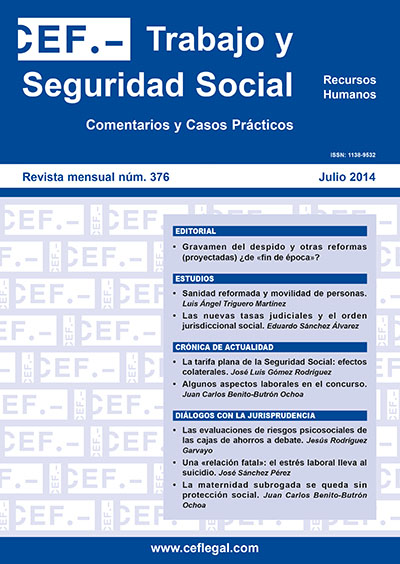La tarifa plana de la Seguridad Social: efectos colaterales
DOI:
https://doi.org/10.51302/rtss.2014.2986Palabras clave:
Seguridad Social, cotizaciones, empleo, economía, sistema de pensionesResumen
El objetivo de este trabajo es el análisis del Real Decreto-Ley 3/2014, de 28 de febrero, de medidas urgentes para el fomento del empleo y la contratación indefinida, por la que se aprueba la llamada tarifa plana de la Seguridad Social, que consiste en una importante reducción de las cotizaciones empresariales por contingencias comunes cuando se celebren contratos indefinidos.
El diseño de la norma no es riguroso con los requisitos para la contratación indefinida, de forma que su eficacia quedará muy reducida –peso muerto–. Además, es inequitativa con las empresas que han hecho mayor esfuerzo en el mantenimiento del empleo. Se trata, además, de una reducción de cuotas regresiva desde la óptica fiscal y que se incardina en el marco de una política económica general basada en la devaluación salarial/costes sociales.
De igual forma, la medida incide en el mercado de trabajo puesto que tiene un ámbito de aplicación muy general, en vez de incentivar el empleo de trabajadores con mayores dificultades o menos cualificados, como aconsejan los organismos internacionales.
El incentivo supondrá una importante minoración de ingresos en las cotizaciones sociales que, dados los supuestos beneficios fiscales que pretende, hubiera justificado su compensación con los Presupuestos del Estado. Además, tendrá repercusión en el cálculo a la baja de la revalorización de las pensiones, recientemente aprobada por la Ley 23/2013. Todo ello debe enmarcarse en un debate más general sobre financiación del sistema de pensiones –que ahora solo se centra en los gastos y no en los ingresos– y de las Recomendaciones del Pacto de Toledo sobre el futuro del sistema de pensiones en España.



















